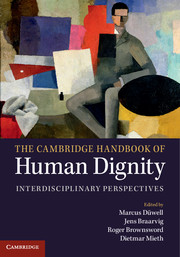Book contents
- Frontmatter
- Contents
- List of contributors
- Foreword
- Why a handbook on human dignity?
- Acknowledgments
- 1 Human dignity from a legal perspective
- 2 Human dignity: concepts, discussions, philosophical perspectives
- Part I Origins of the concept in European history
- Part II Beyond the scope of the European tradition
- Part III Systematic conceptualization
- 19 Social and cultural presuppositions for the use of the concept of human dignity
- 20 Is human dignity the ground of human rights?
- 21 Human dignity: can a historical foundation alone suffice? From Joas’ affirmative genealogy to Kierkegaard's leap of faith
- 22 Kantian perspectives on the rational basis of human dignity
- 23 Kantian dignity: a critique
- 24 Human dignity and human rights in Alan Gewirth's moral philosophy
- 25 Human dignity in the capability approach
- 26 Human dignity in Catholic thought
- 27 Jacques Maritain's personalist conception of human dignity
- 28 Scheler and human dignity
- 29 Dignity and the Other: dignity and the phenomenological tradition
- 30 Dignity, fragility, singularity in Paul Ricœur's ethics
- 31 Human dignity as universal nobility
- 32 Dignity in the ubuntu tradition
- 33 Posthuman dignity
- 34 Dignity as the right to have rights: human dignity in Hannah Arendt
- 35 Individual and collective dignity
- Part IV Legal implementation
- Part V Conflicts and violence
- Part VI Contexts of justice
- Part VII Biology and bioethics
- Appendix 1 Further reading
- Appendix 2 Universal Declaration of Human Rights
- Index
- References
23 - Kantian dignity: a critique
from Part III - Systematic conceptualization
Published online by Cambridge University Press: 05 March 2015
- Frontmatter
- Contents
- List of contributors
- Foreword
- Why a handbook on human dignity?
- Acknowledgments
- 1 Human dignity from a legal perspective
- 2 Human dignity: concepts, discussions, philosophical perspectives
- Part I Origins of the concept in European history
- Part II Beyond the scope of the European tradition
- Part III Systematic conceptualization
- 19 Social and cultural presuppositions for the use of the concept of human dignity
- 20 Is human dignity the ground of human rights?
- 21 Human dignity: can a historical foundation alone suffice? From Joas’ affirmative genealogy to Kierkegaard's leap of faith
- 22 Kantian perspectives on the rational basis of human dignity
- 23 Kantian dignity: a critique
- 24 Human dignity and human rights in Alan Gewirth's moral philosophy
- 25 Human dignity in the capability approach
- 26 Human dignity in Catholic thought
- 27 Jacques Maritain's personalist conception of human dignity
- 28 Scheler and human dignity
- 29 Dignity and the Other: dignity and the phenomenological tradition
- 30 Dignity, fragility, singularity in Paul Ricœur's ethics
- 31 Human dignity as universal nobility
- 32 Dignity in the ubuntu tradition
- 33 Posthuman dignity
- 34 Dignity as the right to have rights: human dignity in Hannah Arendt
- 35 Individual and collective dignity
- Part IV Legal implementation
- Part V Conflicts and violence
- Part VI Contexts of justice
- Part VII Biology and bioethics
- Appendix 1 Further reading
- Appendix 2 Universal Declaration of Human Rights
- Index
- References
Summary
No philosophical discussion of dignity influences current debate more than Immanuel Kant's. Interwoven with central tenets of his ethics, this discussion admits of various interpretations. According to a prominent one, Kant defends the view that dignity is an unconditional and incomparable value possessed by all persons and only persons. This chapter assesses the philosophical plausibility of this view, arguing that, although it has attractive features, it suffers from serious flaws.
Kant's discussion of the dignity of humanity is centred in the Groundwork of the Metaphysics of Morals (Kant 1996a) and the Metaphysics of Morals (Kant 1996b). Kant uses ‘humanity’ interchangeably with ‘rational nature’ (Kant 1996a: 439). In his view, having rational nature involves having certain capacities, including the capacity to set and to pursue ends as well as the capacity to act autonomously (Hill 1992: 38–41). To have the capacity to act autonomously, that is, to conform to self-given moral imperatives purely out of respect for these imperatives, is to have a distinctive kind of freedom, according to Kant. A being has dignity if and only if it possesses rational nature, he suggests. If there are any human beings who do not possess rational nature, then they do not have dignity. But any being, human or not, who does possess rational nature has dignity. Let us call any being who possesses rational nature a ‘person’. Rational nature is a threshold concept, in Kant's view. If a being has the capacities that are constitutive of rational nature, it has rational nature, regardless of how well- or ill-developed those capacities may be.
- Type
- Chapter
- Information
- The Cambridge Handbook of Human DignityInterdisciplinary Perspectives, pp. 222 - 229Publisher: Cambridge University PressPrint publication year: 2014
References
- 5
- Cited by



